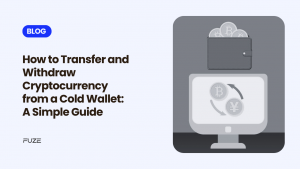Bitcoin has transformed the world of digital payments, and as it becomes more widely adopted in business transactions, it’s crucial for companies to understand the foundational element of Bitcoin transactions: the Bitcoin address. Ensuring the secure handling of Bitcoin addresses can minimise risk, protect assets, and streamline operations in the digital economy. In this guide, we’ll walk through the essentials of Bitcoin addresses and how businesses can effectively use and secure them.
What Is a Bitcoin Address?
A Bitcoin address is a unique identifier used to send and receive assets. It’s similar to an account number in traditional banking but is distinct in that it’s created cryptographically and is not tied to a central authority. The address itself is a string of alphanumeric characters that serves as the destination for Bitcoin transactions. Think of it as an email address—an identifier where you can send or receive messages, or in this case, funds.
For businesses, understanding the nature of Bitcoin addresses is essential for facilitating transactions securely and efficiently, without the traditional banking intermediaries.
Public vs. Private Keys: What You Need to Know
Bitcoin addresses work in conjunction with two cryptographic keys: a public key and a private key. Here’s how they work together:
- Public Key: This is a cryptographic code that is mathematically derived from the private key and serves as the basis for generating the Bitcoin address. The public key allows others to send Bitcoin to the address.
- Private Key: This is a secure cryptographic key that only the owner should know. The private key allows the holder to access the funds in the Bitcoin address and authorise outgoing transactions.
For businesses, safeguarding the private key is vital, as anyone with access to the private key can control the funds associated with the Bitcoin address. Loss of the private key means loss of funds, as there is no central authority to recover it.
How Bitcoin Addresses Work
Bitcoin addresses are generated from the public key through a series of cryptographic processes. When a business receives Bitcoin, the sender uses the recipient’s Bitcoin address to complete the transaction. The recipient then needs the private key associated with the address to access and control the received funds.
Each Bitcoin address is unique, and it’s recommended not to reuse addresses to enhance privacy and security in transactions. For businesses, especially those handling large volumes of Bitcoin payments, understanding the lifecycle of these addresses is critical to maintain a secure payment system.
How to Generate a Bitcoin Address
Generating a Bitcoin address is straightforward and can be done through various wallet services:
- Choose a Wallet Provider: Bitcoin wallets, such as hardware wallets, software wallets, or custodial services, allow users to create Bitcoin addresses.
- Generate a New Address: Most wallets have an option to create a new Bitcoin address with a single click or tap.
- Securely Store the Private Key: Once a new address is generated, it is crucial to keep the associated private key secure.
Types of Bitcoin Addresses Explained
There are several types of Bitcoin addresses, each with its format and use case:
- Legacy (P2PKH): This is the original Bitcoin address format, starting with a “1”. While universally supported, it is now considered less efficient compared to newer types.
- SegWit (P2SH): These addresses start with a “3” and were introduced to support Segregated Witness (SegWit), a protocol that reduces transaction size and fees.
- Native SegWit (Bech32): These addresses start with “bc1” and offer even greater efficiency and lower fees. They are increasingly supported by wallets and exchanges.
Why Businesses Should Care About Bitcoin Address Security
Security is paramount in Bitcoin transactions, as Bitcoin’s decentralised nature means there are no banks or institutions to retrieve lost funds. For businesses, Bitcoin address security protects against theft, fraud, and operational disruptions. Address security also builds trust with clients and partners, demonstrating a commitment to secure financial practices.
A secure Bitcoin payment process can protect the business’s financial health, reputation, and client relationships, making it essential for businesses to prioritise security measures for their Bitcoin addresses.
The Importance of Security in Using Bitcoin Addresses
When it comes to Bitcoin addresses, security extends beyond just protecting private keys. It includes using secure software, implementing regular backups, and controlling access to wallets. Businesses should also conduct regular audits to detect any unusual activity that might indicate unauthorised access.
Security threats, such as phishing attacks, malware, and compromised software, pose risks to Bitcoin addresses and wallets. Businesses can mitigate these threats by using cold storage (offline storage for private keys), multi-signature setups, and employing reputable wallet providers with industry-standard security protocols.
Best Practices for Storing and Managing Bitcoin Addresses
To safeguard Bitcoin addresses, businesses should implement best practices, such as:
- Use Hardware Wallets: These are physical devices that securely store private keys offline, providing robust protection against hacking.
- Keep Backups: Regularly backup wallet files in secure locations. Ensure backups are stored offline and accessible only to authorised personnel.
- Implement Multi-Signature Wallets: Multi-signature wallets require multiple private keys to authorise a transaction, adding an extra layer of security.
- Educate Employees: Ensure that employees handling Bitcoin transactions understand security protocols, including recognizing phishing attempts and protecting private keys.
By following these practices, businesses can minimise risks and ensure a secure environment for Bitcoin transactions.
Common Mistakes to Avoid with Bitcoin Addresses
Businesses new to Bitcoin often make common mistakes that can compromise security or lead to transaction errors. Avoid these pitfalls:
- Not Securing Private Keys Properly: If private keys are stored on a device connected to the internet, they are vulnerable to hacks. Always store private keys in secure, offline locations.
- Sending Funds to the Wrong Address: Bitcoin transactions are irreversible. Always double-check addresses before initiating a transaction to avoid costly errors.
- Using Unreliable Wallets: Choose reputable wallet providers and avoid wallets that do not offer strong security features, as this can expose funds to theft.
Future Trends: What’s Next for Bitcoin Addresses?
Bitcoin addresses will continue to evolve as the cryptocurrency ecosystem matures. Innovations like Taproot and Schnorr signatures are already enhancing Bitcoin’s functionality and security. These developments could lead to more efficient and private Bitcoin addresses, making transactions faster and more secure for businesses.
Moreover, with growing adoption, Bitcoin addresses may integrate more seamlessly with existing business payment systems, allowing companies to handle Bitcoin alongside fiat currencies with ease. For businesses, staying updated with these advancements can provide a competitive edge and optimise their crypto transaction processes.
In conclusion, understanding Bitcoin addresses is essential for businesses looking to engage in secure, efficient crypto transactions. By following best practices for security, businesses can protect their assets, mitigate risks, and build trust with clients and partners. Fuze provides solutions tailored to business needs, ensuring that companies can leverage Bitcoin technology with confidence and robust security.
Disclaimer: Virtual assets carry significant risks, including high volatility and potential loss of your entire investment. They are not backed by governmental protections, and recourse may be limited in case of loss. Always assess your risk tolerance, fully understand the risks, and seek independent financial advice if needed before investing.
Frequently Asked Questions
1. Why should businesses be concerned with Bitcoin address security?
Since Bitcoin is decentralised, there’s no way to recover funds if they’re stolen. For businesses, securing Bitcoin addresses is essential to protect assets from theft, fraud, and unauthorised access.
2. How can businesses generate a Bitcoin address?
Bitcoin addresses can be generated using a secure wallet provider, which typically offers easy address generation. Choosing a reputable provider that emphasises security is crucial for protecting business assets.
3. What is the best way to store Bitcoin addresses securely?
For the highest security, businesses should use hardware wallets, keep multiple backups of wallet files, use multi-signature wallets, and control access to private keys. Storing private keys offline (cold storage) is also recommended.
4. What are some common mistakes businesses make with Bitcoin addresses?
Common mistakes include reusing addresses, not securing private keys, sending funds to incorrect addresses, and using unreliable wallet providers, all of which can lead to loss or theft of funds.
5. How does a multi-signature wallet enhance Bitcoin address security?
A multi-signature wallet requires multiple private keys to authorise a transaction, providing an additional layer of security. It’s especially useful for businesses that need to distribute transaction approval among multiple people.







